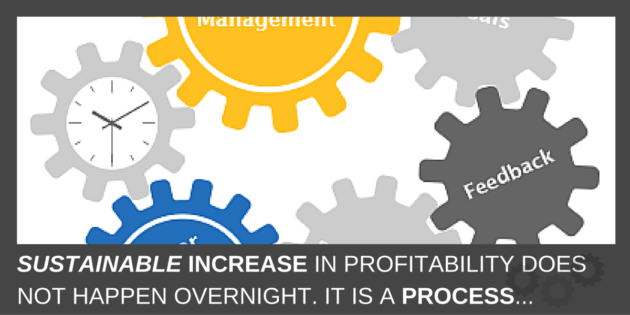Performance Management is a process that every member of your team must master. It requires consistent focus along with the fundamental management skills to ensure the process is efficient and effective. Every manager will be inclined to think ‘I could do it faster’, ‘I can do it better’, ‘I might as well just do it myself’, etc. but the company will never achieve its full potential unless every manager down to the supervisory level learns, rather than to DO things, to GET THINGS DONE through other people. In fact, the inability to effectively delegate is the number one factors holding managers back from progressing in their careers.
What is a performance management process?
An effective performance management process will:
- clarify and quantify goals and expectations
- properly align the resources of the organization to achieve its goals
- clarify a comprehensive strategy to achieving the goals
- consistently monitor individual and overall performance
- inspire the growth of employees in executing their responsibilities
- allow for timely course correction
In THE PIP, we recommend that the owner of the company meet with the management team to create the overall performance management system. This includes the setting of goals as well as the development of the strategy to achieve those goals. Each manager, in turn, should meet with their team in the same fashion. This systematic approach ensures that everyone is on the same page and also has the potential to expand the vision for the company.
The steps for accomplishing this are detailed in THE PIP Checklist. Generally:
Goals. The primary goals for the company are its Mission (the promise to the customer that sets the company apart from its competition) and the Vision (what the company will achieve in delivering upon its promise to its customers).
Strategy. Not only what needs to happen in order for the company to achieve its goals but also consideration to what can go wrong. It requires an alignment of all available resources, including and especially time, and the integration of the activities of every member of the team.
Monitoring. There is a big difference between performance monitoring (historical observation of achievement – or lack thereof – relative to set objectives) and performance management (pro-active management to achieve objectives). Managers must not only monitor performance but create milestones and consistently monitor those milestones. Many micro-manage ‘after the fact’. The key to effective performance management is to establish specific milestones in advance, get agreement on the milestones and the specific dates for accomplishment, and then to consistently monitor performance so that appropriate action can be taken on a timely basis.
Appropriate Action. This could be an entire article on its own. The absolutely critical aspects of taking appropriate action, however, are 1) ensure it is done on a timely basis (in time to get back on track), 2) NEVER chastise an employee in front of anyone else and 3) the most-oft neglected aspect of taking appropriate action – find opportunities to praise excellent performance publicly.
Rewarding. And one last word related to appropriate action. ONLY reward a person if they exceed expectations. It is important to not reward a person, be it praise, a raise or otherwise, for doing the job that was expected of them. That is what their paycheck is for. If you have generally poor performance or morale, turn things around by setting easier goals that people can exceed but do not reward people for merely doing the job for which they are getting paid.
THE PIP is systematic process for creating a performance management system. To get started, download your FREE PIP Checklist here.


36 Comments
Marinda Coast
October 16, 2016I believe other website owners should take this web site as an example , very clean and good user genial design and style.
pop over to this site
October 31, 2016It?¦s actually a nice and useful piece of information. I?¦m glad that you shared this useful information with us. Please keep us informed like this. Thank you for sharing.
eebest8 back
December 9, 2016“You have observed very interesting details! ps decent web site.”
najlepsza dieta odchudzajaca
December 13, 2016I really like and appreciate your article post.Really thank you! Great.
waist-trainer.org
December 15, 2016“I loved your blog post.Much thanks again. Really Cool.”
Freelance writers needed
December 17, 2016I truly appreciate this article post. Want more.
vape
December 22, 2016“Here is a superb Weblog You may Find Fascinating that we Encourage You”
subwaysurfersgame.net
January 11, 2017Appreciate you sharing, great article post.Thanks Again. Awesome.
mp3 songs
January 18, 2017Fantastic post.Thanks Again. Want more.
Stop aux fausses annonces de crédit rapide
January 23, 2017I value the post.Really looking forward to read more. Really Cool.
http://100bestwhatsappstatus.com/
January 25, 2017A round of applause for your blog post.Really thank you! Fantastic.
compression and shape wear leggings for women
January 30, 2017“Wonderful post! We will be linking to this particularly great article on our website. Keep up the good writing.”
Beard balm
February 2, 2017Wow, great post.Really looking forward to read more. Great.
best designer for websites chichester
February 9, 2017“Thanks for some other great post. Where else may anybody get that kind of information in such an ideal method of writing? I’ve a presentation next week, and I am at the look for such information.”
kibris bahis siteleri
February 18, 2017I really enjoy the blog article.Really looking forward to read more. Awesome.
Things to do in dc
February 20, 2017“Do you mind if I quote a few of your posts as long as I provide credit and sources back to your webpage? My blog is in the very same area of interest as yours and my users would truly benefit from a lot of the information you present here. Please let me know if this okay with you. Cheers!”
seo services expert
February 20, 2017“Wow, great post.Thanks Again. Cool.”
bets10
February 21, 2017I really enjoy the blog article. Keep writing.
minecraft
February 25, 2017I am sure this paragraph has touched all the internet viewers, its really really good article on building
up new website.
minecraft
February 25, 2017We’re a group of volunteers and opening a new scheme in our community.
Your web site provided us with valuable information to work on. You
have done an impressive job and our whole community will be thankful to you.
tinder dating site app
February 26, 2017Very great post. I just stumbled upon your weblog and wanted to say that I
have really enjoyed surfing around your weblog posts.
In any case I’ll be subscribing for your rss feed and I hope you write again soon!
tinder dating site free search
February 27, 2017I needed to thank you for this excellent read!! I certainly loved every bit of it.
I’ve got you bookmarked to look at new stuff you post…
minecraft
February 28, 2017I want to to thank you for this fantastic read!!
I definitely loved every little bit of it. I have you
book-marked to check out new stuff you post…
tinder dating site
March 1, 2017Thanks for finally writing about >Performance Management Process – <Liked it!
minecraft
March 2, 2017Write more, thats all I have to say. Literally,
it seems as though you relied on the video to make your point.
You definitely know what youre talking about, why waste your intelligence on just posting videos to your
weblog when you could be giving us something informative to read?
Seattle Sounders
March 2, 2017Seattle Sounders
KieraWall Rumanien EdwinNao
SammyRxo Paris Saint Germain ElizbethH
TommysaB USA NydiaKeen
EdwardHar Liverpool Valentina
SybilMini Kroatien DanielleB
minecraft
March 2, 2017Hi there, I found your website by means of Google whilst
looking for a related topic, your web site got here up,
it seems good. I’ve bookmarked it in my google bookmarks.
Hi there, just was alert to your blog thru Google, and located that it is really informative.
I’m going to be careful for brussels. I’ll be grateful
when you continue this in future. A lot of other folks will
be benefited from your writing. Cheers!
tinder dating site
March 4, 2017You really make it appear so easy together with your presentation but I find this matter to be really something which I believe I might by no
means understand. It sort of feels too complicated and very vast for me.
I am having a look ahead in your subsequent submit, I’ll attempt to
get the cling of it!
Magliette Calcio A Poco Prezzo
March 4, 2017MarisolRu Schweiz BradLeroy
DaniloNob Kroatien JensGalla
TysonGrag Kroatien AndraStin
ChantalCl Inter Milan TiffinySt
Iolatmsat Real Madrid WendyLove
bayern trøje børn
March 4, 2017LouisRose Brasilien KandisHal
IolaBurgo Chelsea LenoraBon
MaudeWilh Chelsea RomanNxgh
SelinaStr Real Madrid GarryZodp
DwainTala Seattle Sounders HildredLo
MelinaGle AC Milan Cornellbj
AndyPrisc Leicester City CharliGot
RosalindM Nederlanderna DonnieBur
ElmaMcGah Sverige BarbraCos
TraceyBli Manchester United SylviaFin
Maglia Inter Bambino
March 4, 2017LovieCarm Real Madrid AdaSuhyfr
KrisWakef Schweiz GemmaLien
Buddyakoy Danmark StevieBau
CoyChacon Kroatien LeilaniSh
KishaBeve Juventus MalcolmCa
ElbaHirsc Schalke 04 MckenzieW
VNZCharli Chelsea JNPKorydq
AZXWinona Tyskland TiffinyCh
BreannaCh Seattle Sounders SeanRimme
EstelleCo West Ham United OlivaMcNa
tinder dating site
March 4, 2017each time i used to read smaller articles which as well clear
their motive, and that is also happening with this post which
I am reading now.
Colombia
March 5, 2017TyronempK Arsenal JamaalBul
Darinizxu Belgien HCDSherma
NeilMqpaf Dortmund ChaunceyQ
CKZSusann West Ham United DonetteSt
ArmandoRa Inter Milan TamikaSch
ThereseSn Spanien EricYamam
SamualFip Juventuss LeandroGa
AnnettaSp Los Angeles Galaxy AmelietuQ
JannetteS USA TheresaSt
DeloresDu Chelsea LeonieIzs
minecraft
March 6, 2017It’s enormous that you are getting ideas from this post as well as from our argument made at this time.
El Monte California Dating
March 7, 2017Have you ever thought about including a little bit
more than just your articles? I mean, what you say is important and
all. However just imagine if you added some great graphics or videos to
give your posts more, “pop”! Your content is excellent
but with pics and videos, this website could certainly be one of the most beneficial in its niche.
Great blog!
El Monte California Dating Sites
March 8, 2017Nice post. I learn something totally new and challenging on websites
I stumbleupon every day. It’s always helpful to read articles from other authors and practice something from other sites.
Leave A Response
You must be logged in to post a comment.